EXCLUSIVEI know that my father committed INCEST with me while I was asleep - he touched me, filmed me and called me a 'slut'. But here's how I've got my revenge...
The last time Caroline Darian saw her father, Dominique Pelicot, he was sitting behind a glass screen in a court room in Avignon. The four-month trial in which Pelicot had been accused of drugging his ex-wife, Gisèle, and soliciting more than 70 men online to rape her – 50 of them were also on trial – was coming to a close.
The evidence was incontrovertible: more than 20,000 videos and images, mostly of Gisèle, asleep and unresponsive while random men subjected her body to sexual acts. But two of the images were of Pelicot’s daughter, Darian, lying prone and exposed on a bed, wearing someone else’s underwear.
‘I still feel anger,’ she says. ‘I didn’t get any concrete answers when this came to my case. He gave different versions. He said he didn’t remember he took those photos. Then he said, “No, it’s not my daughter.” Then he said, “I never touched you, Caroline.” He is lying every time.’
It is less than a month since the end of the trial. We are sitting in a sun-filled room in London’s King’s Cross. Darian, 46, is drinking a cappuccino. She wears a purple scarf that she adjusts periodically. In court that day, she shouted at Pelicot, ‘You’ll die alone like a dog!’
‘I had to look at him right in the eyes,’ she explains. ‘I had to say, “I don’t believe you. And you will pay anyway.” You know when someone is lying and you know the truth inside of you. You can’t cope with that. It’s not fair. How many secrets does he have?
‘So you have to live with this uncertainty,’ she continues. ‘Even if I have a deep conviction that he drugged me and it wasn’t only for taking those photos. I know that he touched me. I know that he did something disgusting. So I have to say to myself, “If I went through this, how many are we in France? How many are we in foreign countries?” I’m sure I’m not an isolated case. How many families experience incest?’
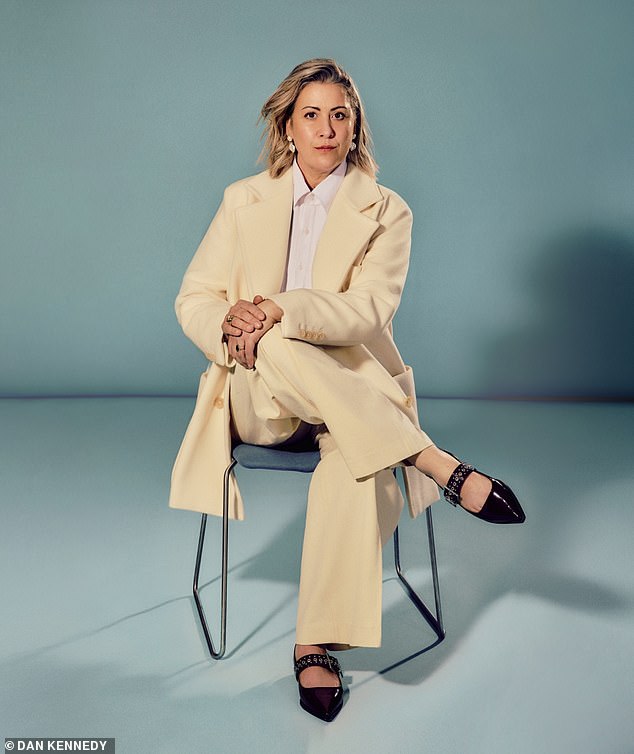
Caroline Darian has founded a nonprofit organisation, M’endors Pas (Don’t Put Me to Sleep), to raise awareness while pushing for government action around chemical submission
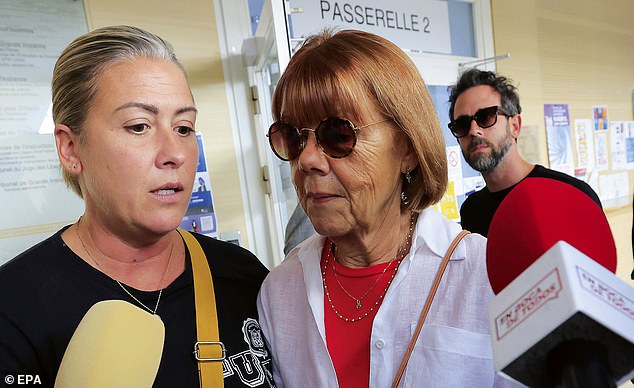
Gisèle, Caroline and brother Florian face the media outside the criminal court, Avignon, in September
Darian has founded a nonprofit organisation, M’endors Pas (Don’t Put Me to Sleep), to raise awareness while pushing for government action around chemical submission – the drugging of victims using easily accessible prescription medicines.
‘The only way that I found to survive was really to engage myself within this cause,’ she says. ‘I did a lot of investigation, I met a lot of people, a lot of victims, and also health professionals. It’s a huge and underestimated social phenomenon.’
She has participated in a new French documentary on the subject, and has written a book, I’ll Never Call Him Dad Again: Turning Our Family Trauma of Chemical Submission into a Collective Fight, first published in France in 2022 and now in this country.
It is a powerful work, simultaneously raw and eloquent – essentially the diary that Darian kept in the days and weeks following the discovery of her father’s manifold crimes. It charts the impact of the revelations, the nights she spent in an emergency psychiatric ward, where she was admitted after she hadn’t slept for five nights straight following her realisation that everything she had believed about her father was false.

Mother and daughter arrive at the criminal court during the trial
‘I lost all my foundations, all my landmarks. It’s a real tsunami,’ she says. ‘You have to rethink all your past life. It was so tough when I realised that I didn’t know my father, who I loved.’
She was raised in a Paris suburb with her two brothers, David, 50, a sales manager and 38-year-old Florian, an actor – she calls them her ‘pillars’, and her nom de plume (Darian) is a conflation of their names. Home was a five-bedroom house provided by their mother’s company, EDF, where she worked in logistics. Their father was an electrician and estate agent.
‘It was a joyful life,’ says Darian. ‘We were a united family. We had dinners, social events, barbecues, and I was the one who was closest to Dominique. He took me to school. He encouraged me in my studies. When I was of an age to go out in the evening, there was no way he’d let me take public transport. That’s crazy. This probably began when I was 15 years old or even before.’
The evidence for Pelicot’s criminal activities starts in July 2011, when he began recruiting men online while the couple were still in Paris, and ends in October 2020. He is, however, under investigation in connection with other rapes and a 1991 murder. ‘We don’t know when was the inaugural event,’ says Darian. ‘The cold-case department in France is still working on his criminal journey. It didn’t start then [in 2011]. He is one of the most [prolific] sexual predators in our society of the past 20, 30 years.’
Her parents met in 1971. His background was more working class than hers. ‘He was coming from a family with an awful dad. And she lost her mother when she was nine. So I think together they found like a puzzle, you know? I always looked at my parents like they were really in love.’
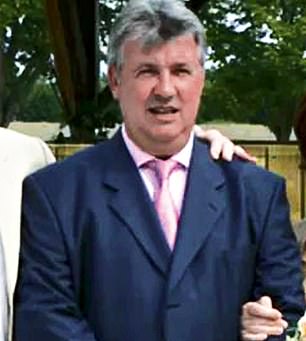
Dominique Pelicot in 2007
Darian went to university and embarked on a career in communications. She stayed in Paris while, in 2013, her parents retired and moved to the pretty Provençal town of Mazan, in the foothills of Mont Ventoux. Gisèle liked to walk in the countryside, among the vineyards and lavender fields; Dominique was a cyclist and an avid gardener. The house was a focal point for the family, a place for gatherings and happy occasions. When Darian got married to Paul, a TV journalist, and had a son, they would visit four times a year: ‘My son was really close to his grandfather. He taught him to swim, read, spent a lot of time with him.’
What nobody realised was that Pelicot was drugging Gisèle with a combination of lorazepam and zolpidem, which he kept in a sock in a boot hidden in the garage. He perfected the cocktail, which he would put in her coffee or her favourite raspberry ice-cream, rendering her unconscious for up to eight hours.
Pelicot would solicit men via a hook-up website and invite them to the house to rape his wife, saying things like, ‘You’re like me, you like rape mode’. He would also rape her in this comatose state. He hand-drew maps with directions to the house; he instructed the men, most of whom were from the local area (‘Monsieur tout-le-monde’ – Mr Everyman – as they became known), to warm their hands under a hot tap before touching his wife so as not to wake her with a cold touch, not to speak when they were with her and to leave immediately if she responded in any way. He required no payment. All he asked was that he could record these encounters, which he kept in a cache on his computer hard drive titled ‘abuse’.
‘You know, in the last years there is a real acceleration,’ says Darian, her voice cracking. ‘In 2020 it was like, I don’t know how many times he did that… How many people. My mum was raped more than… It’s probably 700 times.’
There are moments during this interview when all we can do is sit in silence. It is so horrific. So incomprehensible. But there is a reason why Darian is talking publicly; because had there been greater awareness surrounding the phenomenon of chemical submission, Pelicot’s actions would have been uncovered sooner. Gisèle experienced multiple health issues. She had amnesia, was often exhausted or had trouble sleeping, she had gynaecological problems, vaginal bleeding, her hair fell out and she lost eight kilos over the decade.
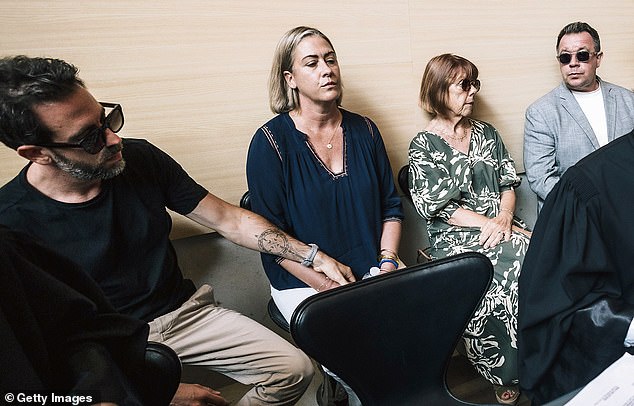
At the courthouse: Caroline and Gisèle with brothers Florian (left) and David (right)
‘I was wondering what was going on,’ says Darian. ‘She didn’t remember that we talked that morning over the phone. She lost memories.’ But when she or her brothers would raise their concerns with their father, he just said that Gisèle was ‘hyperactive’; that she would exhaust herself when she helped look after the grandchildren; that somehow it was their fault, or Gisèle’s. He was the one who accompanied her when she visited the doctor with her symptoms. It was suggested that she might have Alzheimer’s or a brain tumour, although no evidence was found when she had a brain MRI. ‘She saw GPs, gynaecologists, neurologists. No one identified what happened in her life. No one.’
Darian’s thinking is that, with greater awareness, a combination of symptoms such as those displayed by her mother would immediately result in a toxicology test. Instead, it was a security guard at the local supermarket who raised the alarm.
In September 2020 he was tipped off by a shopper that Pelicot was secretly videoing up women’s skirts, and reported him to the police, who began an investigation. They confiscated phones and a laptop, a video recorder, camera and SD card.
When Pelicot was confronted with his crimes he did not deny what he had done and expressed no regret; instead he thanked the officers for ‘lifting a weight’ off his shoulders.
On a Monday evening in November 2020, Gisèle told Darian what the police had discovered. It was 8.25pm precisely, Darian remembers, when the fissure opened in her life. Up until this moment she had never had any suspicions about her father. She trusted him, she says, 100 per cent. ‘That’s probably the most difficult to integrate because there hadn’t been any signal. There was no warning. I think he was really split in two. There was a face A and a face B.’
Darian and her brothers went to the house in Mazan to help their mother dismantle it. They wanted to get her out as soon as possible, throwing away most of the family possessions. In the process they discovered that Pelicot had amassed substantial debts, taking out secret loans in his wife’s name and mismanaging the family finances – an irony, considering how methodical he was in organising the abuse. As the days progressed, more horrors were revealed. Pelicot had hidden cameras in the house and taken photographs of Darian, as well as his daughters-in-law, naked, created montages of Darian and Gisèle naked under the title ‘the slut’s daughter’ and shared them online with obscene captions.
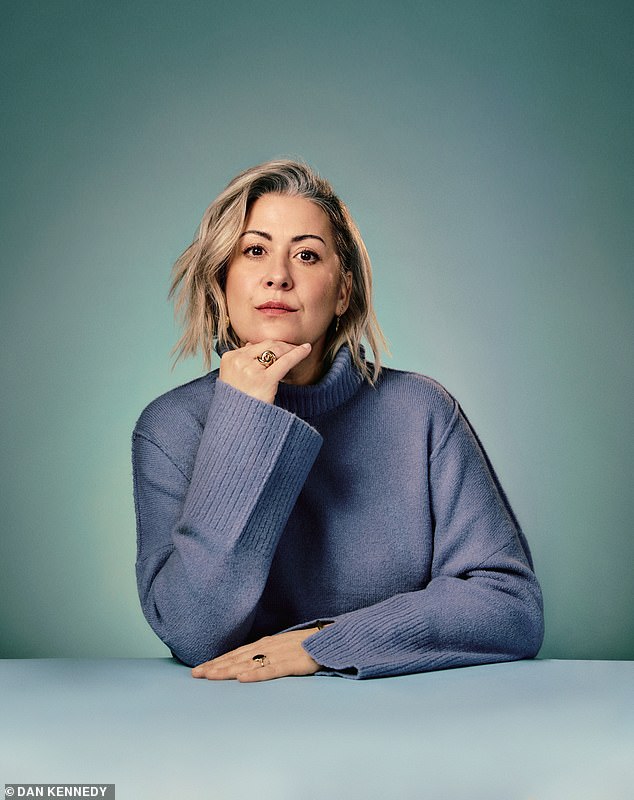
When Caroline was growing up she always considered her mother the stronger of her two parents
Then there were the two photographs of Darian. When Pelicot was asked about them he said, ‘It’s just curiosity. I wanted to lift the veil.’ When Darian was first shown them she did not recognise herself – she never usually slept in that position and the underwear she was wearing wasn’t her own – until it was pointed out that they had the same birthmark.
‘I was in a state of shock, of disassociation. Your brain is not ready. And then [the police officer] told me, “But you have a mark here”. Then you know – and it’s difficult to integrate the truth. Everything collapses around you. I don’t have any memories of those two pictures. One was taken in my house in Paris, in my bedroom. And the other picture… I don’t know where I am.’
The one element of the case in which mother and daughter are not in accord is whether or not Pelicot abused Darian. In the book, Gisèle is quoted as saying, ‘Your father is incapable of such a thing. I just can’t believe it… Because if I could it would destroy me utterly.’ I ask if Gisèle’s position has shifted. ‘I don’t know what she has in mind. She went through some terrible things. I think for her she has to cope with her own story. You live with your own trauma. No one can take it.’
When Darian was growing up she always considered her mother the stronger of her two parents. ‘My father was not really responsible from a financial standpoint. I always felt that he was a kind of a child. He was crying when he was not doing well. He was more fragile. So when I was a young child, I wanted to protect him.
‘This is probably the main reason why I wanted to do better than him. When I was a child I really wanted to be independent. I was always a strong personality,’ she says. ‘You know, without realising who he was, I built myself to be the opposite of him.’
Gisèle was more reliable, more stoic, more emotionally contained. In the book Darian describes her as ‘like a medieval queen… never the slightest complaint… she is the real heroine of this story’. Darian herself is ‘an open book, my emotions there for all to see’.
‘It’s a generation thing, a cultural shift really,’ she says. ‘Look at my mum – she was really silent, walking in every day at court, saying no words. The women of my generation behave like me – we are not needing to stay silent.’
Likewise, Darian is not afraid of expressing her anger. ‘It’s a kind of a fuel to me,’ she says, ‘and it’s not wrong to get angry. It’s a normal response. My mum, for instance, she never felt anger. I don’t know how that can be possible. Do you see how we don’t have the same mechanism?’
Among the ways that Darian coped in the immediate aftermath of the discoveries about her father was by writing a journal. She always knew that she would publish, even though her husband warned her against it. ‘He was afraid, like my very closest friends. “Don’t do that, Caroline,” they said. “You will be exposed.” I didn’t listen. I knew that I had to do this. I think it’s a kind of a life mission, you know? You have to do something noble, useful for others. Otherwise, there’s no sense.’
Likewise, it was Darian who said to Gisèle that the trial should be public: ‘Right from the beginning I told her, “Mum, you can’t let this trial be closed because it’s going to be a gift for Dominique and also for the 50 others.” By deciding to leave the door open for this trial, all the perpetrators have to face their crime publicly. The shame had to change sides. This is a thing that I wrote three years ago. It’s not for the victim to bear that on their shoulders – but she was the one who had to decide.’
In March 2024 Gisèle finally concluded that the trial would be public. Not only that, she chose for the videos of her being assaulted while comatose to be shown, including instances both in Darian’s own house and her holiday home. As a result Gisèle, with all her quiet dignity, has become a feminist icon. Women cheered her as she arrived at court in Avignon every day. Murals of her decorate the walls, along with the slogan ‘Shame must change sides’. She has been voted the most influential person of the year in France and has inspired more women to have their rape cases held openly.
Meanwhile, Pelicot was found guilty and sentenced to 20 years in jail. The other 50 men were found guilty of rape, attempted rape or sexual assault – although 17 are appealing. ‘They still didn’t understand that they are rapists,’ says Darian. ‘It’s the problem of male domination. It’s a cultural thing and it’s not only in France.’
The trial offered some relief for Darian. Prior to it she had been dreaming about her father. She struggled with missing the man who had been her father for more than four decades, with what she describes in her book as ‘the stubborn empathy that comes from being someone’s child’.
‘I was so stressed about being in front of him for the first time in four years. I was having dizzy moments. But the minute that I saw him, it stopped. This trial allowed me to realise that my father is not my father any more. He’s a stranger to me. I’m not sad any more. I don’t miss him any more because I know who he really is and he doesn’t interest me.’
Darian still works as a communications manager in Paris, but she is also running her nonprofit with a team of ten volunteers. ‘I can’t cope with injustice. If you want to change your world you have to fight.’
She does so from her house, the place where her father photographed her without her knowledge but which she refuses to sell. ‘There’s no way he can take control of my life,’ she says.
For the time being she intends to keep her day job as well as campaigning. ‘At this stage I need to get a balance,’ she says. ‘I’m taking it day by day. My objective is to strengthen the cause, strengthen my charity, undertake concrete initiatives, at least in France.
‘Our mission is to drive awareness around chemical submission. So we’re working with the government on an inquiry to assess the situation and to bring out a report, like a white paper, in a few months. To try to really figure out what could be put in place.’
She sees a psychotherapist once a week, likes to walk, to see her friends, to be with her family. Her son is ten now. ‘He knows everything. We didn’t want to lie – we found the right words and he understands. He doesn’t want to talk about [his grandfather] any more.’ Like Darian, her son has been in therapy, too. ‘He’s doing well. He’s really stable. That’s really joyful. I think he’s going to have a strong personality, as well.
‘He says to me, “Mum, I’m so proud of you. You did a lot of things for the others.” We talk a lot. It’s part of his education. I want him to respect women, men. That’s really precious for the next generation.’ Darian is committed to stopping her family trauma from seeping out further.
She wants to create a different sort of world for her son, one without pain and secrets, even if she is unable to give that to herself, despite all her strength, despite all that she has achieved, alchemising horrific personal experience into wider social change.
‘It’s so tough every day, since the beginning of this story. Even if the trial is over, it’s not really over for us. It will never be finished for us. We have to cope and to live with that. It’s a really tough legacy. But I feel that, as it’s me, I can go through it.’
Is there anything she would like to add, a message she wants to convey? ‘I just want to say to victims, trust yourself. If you have doubts, speak out. There is always someone who will listen. Don’t stay with your silence. You can change everything.’
Picture director: Ester Malloy.
Styling: Rachel Davis.
Hair: Julie Read at Carol Hayes using Color Wow.
Make-up: Dani Guinsberg using Rare Beauty.
getty images, dr, epa/guillaume horcajuelo























































































































































































































































































































